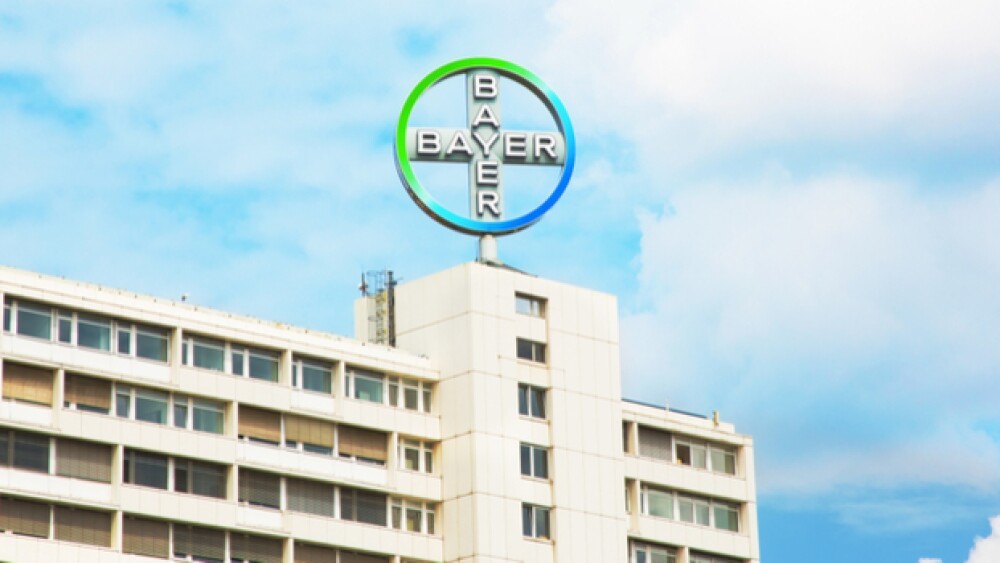In July 2017, Bayer launched a three-year, Phase III ASTEROID clinical trial of vilaprisan in patients with symptomatic uterine fibroids, with the intention of recruiting more than 3,600 patients in 900 sites in 40 countries.
LUMIKK55 / Shutterstock.com
Frankfurt, Germany-based Bayer reported that it had halted enrollment in a clinical trial of its vilaprisan for uterine fibroids.
In July 2017, Bayer launched a three-year, Phase III ASTEROID clinical trial of vilaprisan in patients with symptomatic uterine fibroids, with the intention of recruiting more than 3,600 patients in 900 sites in 40 countries.
Uterine fibroids are common but benign gynecological tumors. Vilaprisan is an oral progestin and selective progesterone receptor modulator (SPRM) with potential anti-progesterone and antineoplastic activities. The drug competitively binds to the progesterone receptor (PR) in progesterone-responsive tissue and inhibits PR-mediated gene expression, which interferes with progesterone activity in the reproductive system.
Bayer indicates that they are halting enrollment in the trials, not because of safety signals found during the trial, but issues observed in ongoing analysis in long-term toxicology studies.
Joerg Moeller, head of Bayer’s drug development, stated, “For vilaprisan we have just some days ago put clinical development of our ongoing trials on hold,” reported Reuters. “That is due to very recent safety findings in long-term toxicology studies…. We have therefore decided as a precautionary measure to stop enrollment into our ongoing program and evaluate the data.”
The toxicology studies were from pre-clinical testing on rodents, which is being carried out in parallel to the Phase III trials.
The company indicated that findings in the preclinical studies haven’t been seen in the human trials, but they were being cautious and pausing recruitment until they could conduct a more thorough analysis. Patients currently in the trials will continue their treatment according to the study protocol.
The drug, if approved, has been projected to generate peak annual sales of more than $1.1 billion. About 5 to 10 percent of women require treatment for uterine fibroids.
It can be a tough disease to treat with drugs, however. In August 2018, the U.S. Food and Drug Administration (FDA) rejected Allergan’s New Drug Application (NDA) for ulipristal acetate for abnormal bleeding from uterine fibroids. The FDA issued a Complete Response Letter, citing safety concerns over post-marketing reports outside of the U.S.
The drug was approved in Europe under the brand name Esmya, but there were reports that the drug led to liver damage in some patients. Although the European Medicines Agency (EMA) didn’t pull the drug off the market, after a three-month investigation, it issued new guidelines to minimize the risk of liver damage. That included noting the drug was contraindicated in women with known liver problems, and recommended liver tests before, during and after treatment with the drug.
In July, the FDA approved AbbVie’s Orilissa (elagolix) for moderate to severe endometriosis pain. Orlissa is an oral nonpeptide small molecule gonadotrophin-release hormone (GnRH) receptor antagonist that inhibits endogenous GnRH signaling. In August, the drug showed positive topline results in the Phase III ELARIS UF-EXTEND extension trial for uterine fibroids.
In combination with low-dose hormone therapy, the drug reduced heavy menstrual bleeding in 87.9 percent of women with uterine fibroids. This was consistent with two previous Phase III trials. The safety profile was consistent with the previous data, as well. Most frequent adverse events were hot flush, night sweats, nausea, headache and nasopharyngitis, as well as reduced bone mineral density. AbbVie expects to submit the drug for approval for uterine fibroids in 2019.





